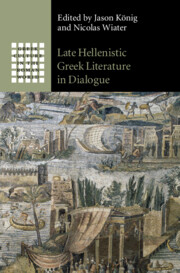Book contents
- Late Hellenistic Greek Literature in Dialogue
- Greek Culture in the Roman World
- Late Hellenistic Greek Literature in Dialogue
- Copyright page
- Contents
- Figure
- Contributors
- Preface
- Abbreviations
- Introduction
- Chapter 1 The Empire Becomes a Body
- Chapter 2 Pyrenaean Mountains and Deep-Valleyed Alps
- Chapter 3 Sailing the Sea, Sailing an Image
- Chapter 4 Ecocritical Readings in Late Hellenistic Literature
- Chapter 5 Civic and Counter-Civic Cosmopolitanism
- Chapter 6 The Wrath of the Sibyl
- Chapter 7 Imagining Belonging
- Chapter 8 Philosophical Self-Definition in Strabo’s Geography
- Chapter 9 Narrating ‘the Swarm of Possibilities’
- Chapter 10 ‘Asianist’ Style in Hellenistic Oratory and Philostratus’ Lives of the Sophists
- Chapter 11 Greek Reading Lists from Dionysius to Dio
- Chapter 12 Envoi
- References
- Index Locorum
- General Index
Chapter 4 - Ecocritical Readings in Late Hellenistic Literature
Landscape Alteration and Hybris in Strabo and Diodorus
Published online by Cambridge University Press: 21 April 2022
- Late Hellenistic Greek Literature in Dialogue
- Greek Culture in the Roman World
- Late Hellenistic Greek Literature in Dialogue
- Copyright page
- Contents
- Figure
- Contributors
- Preface
- Abbreviations
- Introduction
- Chapter 1 The Empire Becomes a Body
- Chapter 2 Pyrenaean Mountains and Deep-Valleyed Alps
- Chapter 3 Sailing the Sea, Sailing an Image
- Chapter 4 Ecocritical Readings in Late Hellenistic Literature
- Chapter 5 Civic and Counter-Civic Cosmopolitanism
- Chapter 6 The Wrath of the Sibyl
- Chapter 7 Imagining Belonging
- Chapter 8 Philosophical Self-Definition in Strabo’s Geography
- Chapter 9 Narrating ‘the Swarm of Possibilities’
- Chapter 10 ‘Asianist’ Style in Hellenistic Oratory and Philostratus’ Lives of the Sophists
- Chapter 11 Greek Reading Lists from Dionysius to Dio
- Chapter 12 Envoi
- References
- Index Locorum
- General Index
Summary
This chapter draws on approaches from the environmental humanities in exploring the hypothesis that late Hellenistic literature was unusually positive in its representations of landscape alteration. It first sketches out the predominantly negative tradition of representing landscape alteration in ancient literature from Herodotus onwards, before examining the more celebratory versions that we find in Strabo and Diodorus Siculus. At the same time it points out, with special reference to the work of Diodorus, that even the most positive treatments of that theme tend to show signs of equivocation and ambiguity. That conclusion has implications for our understanding of the long history of human interaction with the environment: it helps to expose the risks of over-simplification involved in any account that seeks to generalise about the idea that ancient culture either anticipates or stands in contrast with modern anthropocentrism. In the process the chapter also explores some of the similarities and differences between ancient and modern representations of environmental damage, pointing out especially that ancient accounts anticipate in some respects modern concerns with the impact of environmental alteration on human populations.
Keywords
- Type
- Chapter
- Information
- Late Hellenistic Greek Literature in Dialogue , pp. 119 - 148Publisher: Cambridge University PressPrint publication year: 2022

